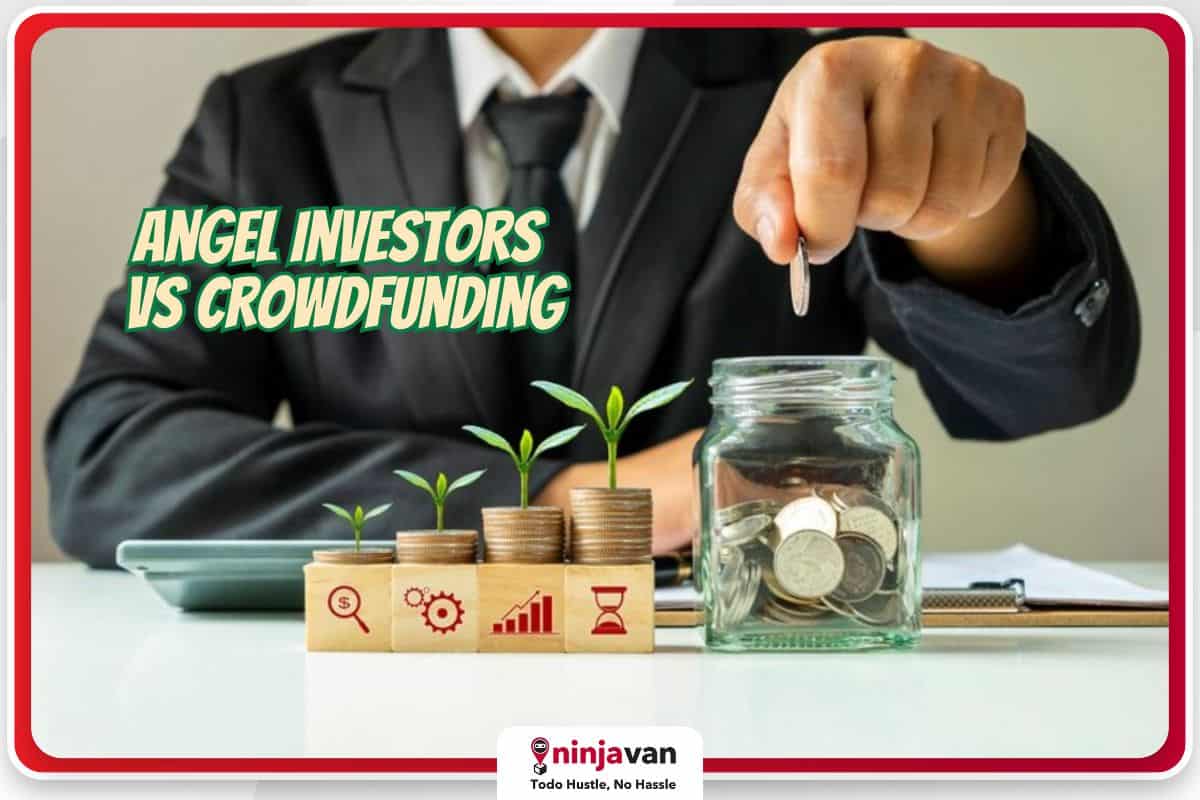Starting a business is an exciting adventure. But let’s be real – turning that awesome idea into a reality often requires some cash. And honestly, a startup is more than just about money.
Access to the right funding can also bring in valuable experience and open doors for your business. It can feel overwhelming trying to figure out where to even start, so let’s break down two popular options: angel investors vs crowdfunding.
What are angel investors?
Think of angel investors as wealthy individuals who believe in startups. They provide funding to young companies in exchange for a piece of ownership – like having a stake in your business. The partnership goes beyond money; angel investors often have tons of business experience and connections, which can be a major asset when you’re starting or growing your company.
Pros and Cons of Angel Investors
Pros:
- Substantial capital: Angel investors can inject a considerable amount of funding into your company, especially compared to bootstrapping or smaller loans. This allows for faster expansion, greater production capacity or even the ability to hire additional team members right away.
- Business expertise: Many angel investors have built successful businesses themselves. They offer a wealth of knowledge and insights, providing guidance on everything from product development and marketing strategies to navigating the complexities of scaling a business.
- Valuable connections: Angel investors often have well-established networks. These relationships can lead to introductions to strategic partners, potential customers, industry leaders or even open doors for media exposure.

Cons:
- Equity dilution: When you accept funding from an angel investor, you exchange a percentage of ownership in your business for their investment. This means you’ll retain less control and have to share future profits with your investor.
- Finding the right fit: Identifying an angel investor whose background and interests align with your business vision takes time and effort. Compatibility with personality and working style is equally important for a successful partnership.
- Shared decision-making: Angel investors often desire a seat at the table when it comes to major business decisions. Be prepared to relinquish some control and ensure your investor’s expectations are clear before accepting funding.
How to find angel investors
Finding the right angel investor for your business takes proactive effort. Here are several tried-and-tested strategies:
- Network strategically: Attend industry-specific conferences, startup events and relevant meetups. These often attract angel investors interested in the latest innovations. Focus on building genuine relationships rather than immediately pitching your business.
- Use online platforms: Specialized platforms like the Angel Investment Network Philippines connect entrepreneurs with potential investors. These sites allow you to search investors by industry and investment preferences, streamlining the initial phase of your search.
- Tap into existing connections: Explore your professional network – mentors, successful entrepreneurs, former professors or even business advisors. They may have connections to angel investors within their network. A warm introduction with potential investors can be more effective than a cold approach.
What is crowdfunding?
Crowdfunding is all about tapping into the power of the crowd. You pitch your business idea or product on an online platform, and a large number of people chip in small amounts of money to support it. It’s like a massive online fundraiser.
How does crowdfunding work?
Crowdfunding begins with choosing the right platform. Research options, like Kickstarter, Indiegogo or cause-driven sites to ensure a good fit for your project. Next, craft an engaging pitch. Think about telling your business’s story, highlighting what makes it special, and using visuals or videos to capture attention.
But a great pitch is just a part of this effort. Successful crowdfunding campaigns rely on relentless promotion. Use social media heavily, tap into your email list and consider if your project has an angle that might interest local media outlets to widen exposure.

Pros:
- Proof of concept: A successful crowdfunding campaign can indicate that there’s interest in your product or service. This can be helpful in securing future funding or partnerships.
- Customer base and community: Crowdfunding allows you to connect with potential customers early on. These early supporters can offer valuable feedback and become loyal fans.
- Retention of full ownership: Crowdfunding, unlike some other funding sources, allows you to retain complete control of your business without needing to give up equity.
Cons:
- Funding limits: Crowdfunding can be fantastic for getting projects off the ground, but it might not be the magic bullet if you need millions to launch a mega-scale venture. The size of your goal will impact the platform you choose and the scale of your marketing efforts.
- Work, work, work!: If you think crowdfunding means hitting “launch” and watching the money roll in, think again. Successful campaigns involve strategizing, creating compelling content and relentless outreach. It’s like a full-time marketing gig for the duration of your campaign.
- Deliver the goods: Rewards-based crowdfunding means more than just offering cool perks. Be realistic about production timelines, shipping costs and the sheer logistics of potentially fulfilling hundreds or thousands of backer orders.
Find the right investor
Which one should you choose – angel investors vs crowdfunding? It really depends on what you need and what feels like the right fit:
- Angel Investors: A good option if you need a lot of money upfront, are confident in your business plan, and are willing to share some ownership and decision-making power.
- Crowdfunding: Great if you’re testing out a new product, want to validate your idea early on and love the concept of building a community of supporters from the ground up.
No matter your path, do your research. Explore different platforms, understand fees and regulations and make sure your choice prepares your business for long-term success.
More helpful tips for your business:
A Guide to Calculating Business Startup Costs
Business Budget Planning: A 5-Step Guide
Creating Your Business Value Proposition







